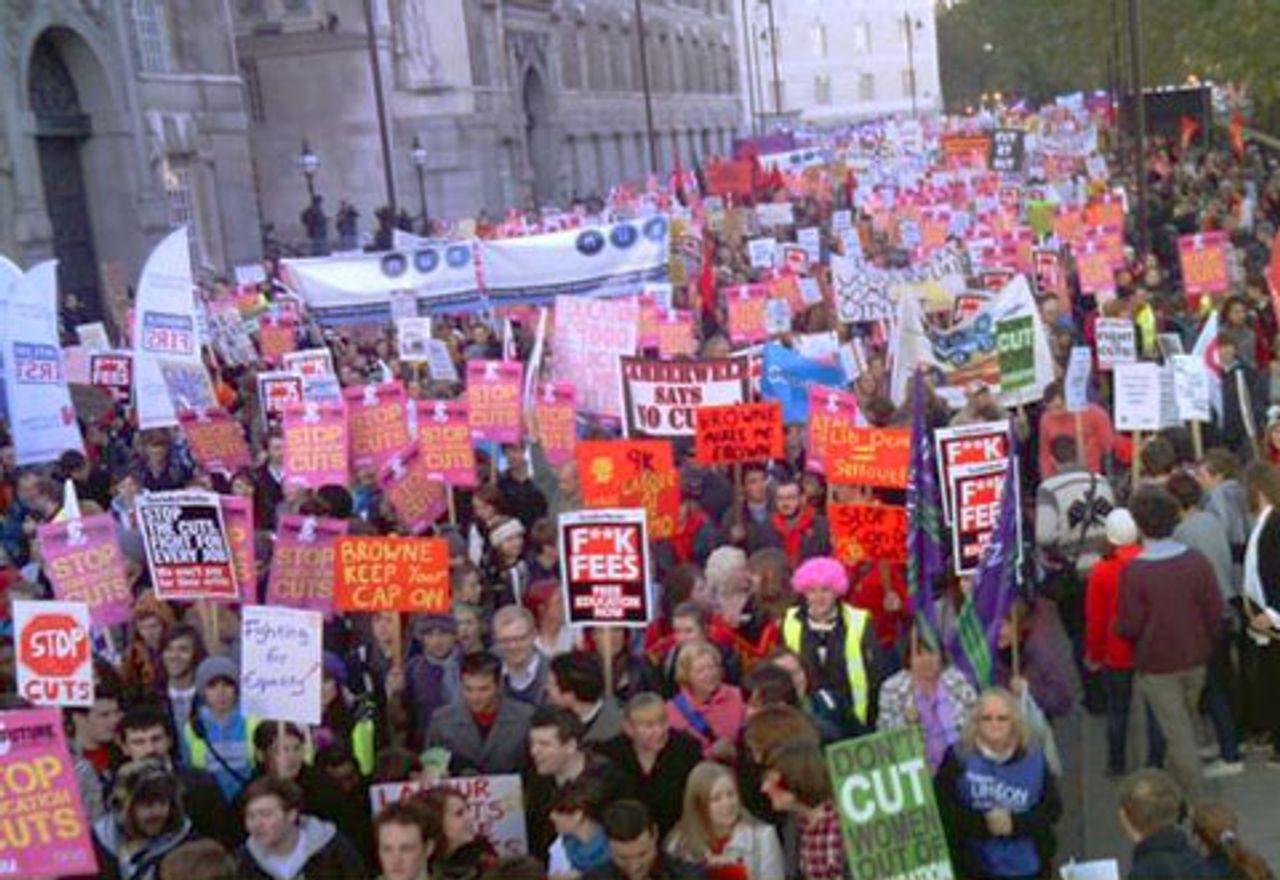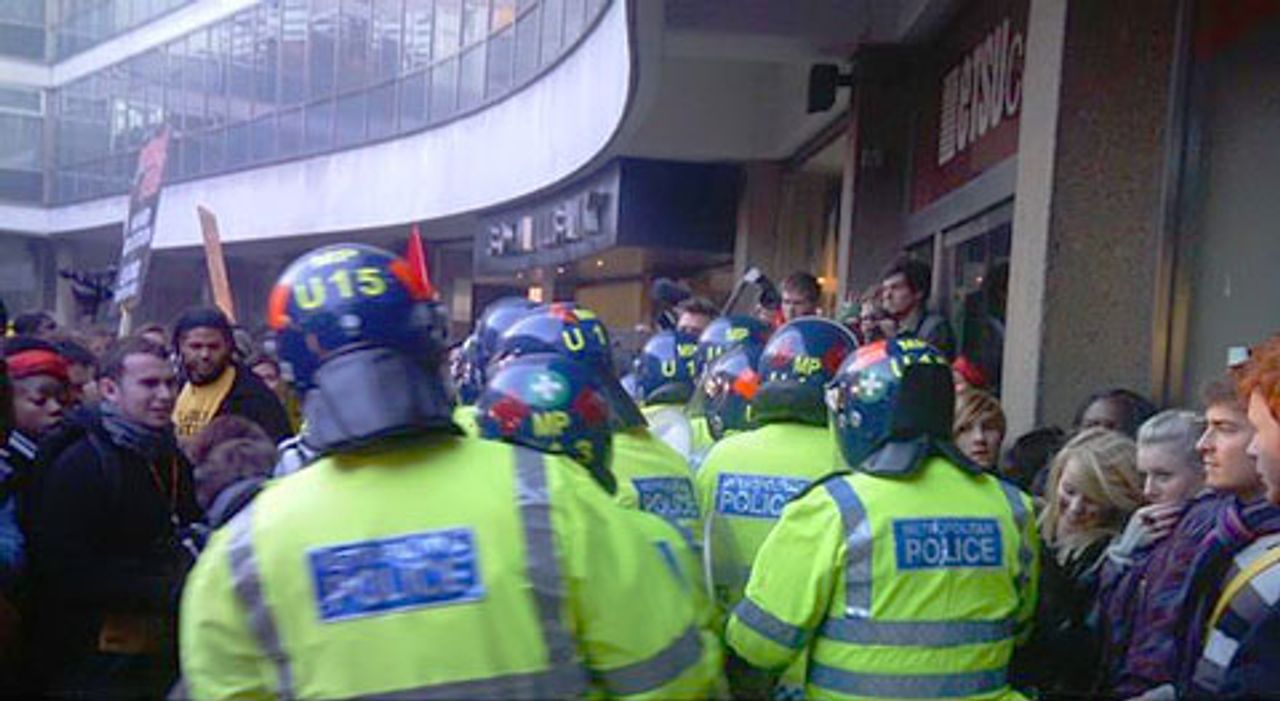A march of more than 50,000 students and academics in London yesterday against the Conservative-Liberal Democratic coalition government’s education cuts ended in the occupation of the Tory Party’s headquarters and confrontations with riot police.
 Demonstrators march toward Conservative Party HQ in London
Demonstrators march toward Conservative Party HQ in LondonThe march’s size massively exceeded expectations of the National Union of Students (NUS) and the University and College Union (UCU), who jointly called it, assembling students from almost every university and college in Britain. It was dominated by home-made banners denouncing the government. City workers and tourists clapped their hands in support.
The Conservative’s Millbank headquarters near to the Houses of Parliament was broken into and occupied. A group barged into the lobby of Millbank before being forced out by police and security officers. They then began setting fire to placards outside the entrance. Windows in the office block were smashed and a number of smoke bombs thrown. More students then invaded the building, while hundreds more outside cheered them on and chanted “Tory scum”.
An action undertaken initially by a few individuals quickly became the focus of the pent-up anger of thousands of students, who face the prospect of a mountain of debt when they finish their studies, and a future of dead-end jobs. The government plans to increase tuition fees to up to £9,000 a year, which will make England and Wales the most expensive places in the world to study at a public university.
The government has also announced that the teaching budget for universities will be cut from £7.1 billion to £4.2 billion by 2014―part of a package of cuts that will see state funding of universities almost entirely replaced by charges on students. Some universities will lose all their funding for teaching, especially those specializing in subjects such as information technology, social studies and the arts.
In London, 10 of the most prestigious universities could see their funding wiped out, including the London School of Economics, the Royal Academy of Music, the School of Oriental and African Studies, the Institute of Education, the Central School for Speech and Drama and the Courtauld Institute of Art. Nearly eight in ten young people will be put off university if annual fees are raised to £10,000, according to a study by the NUS.
 Police surrounded by demonstrators outside Conservative Party HQ in London
Police surrounded by demonstrators outside Conservative Party HQ in LondonRiot police were ordered in to the Millbank Tower to end the occupation, but initially scattered in disarray down side streets, prompting the Metropolitan Police commissioner to admit it was an “embarrassment” for his force. The Metropolitan Police say that 32 arrests were made and there are numerous reports of police violence, with film footage on social networking sites of students being hit indiscriminately with batons and riot shields.
The students’ action was an implicit rebuff to the pathetic strategy of “influencing” the coalition government being promoted by the NUS and UCU, focusing on demands for Liberal Democrat MPs to be “recalled” for failing to honour their election pledge to oppose a rise in tuition fees. A procedure to recall MPs does not even exist.
The establishment of such a procedure is only another worthless pre-election promise by the Lib-Dems. It is unlikely to come into being for several years under any circumstances and would be directed only at MPs guilty of “serious wrongdoing”―hardly likely to affect an MP carrying out government policy!
Inside parliament, Liberal Democrat leader Nick Clegg, the deputy prime minister, speaking for the government in Prime Minister David Cameron’s absence, made clear that the cuts would go ahead, while Labour attempted to score a few points that commit the party to nothing whatsoever.
The NUS immediately denounced the occupation as “disgraceful” and as the work of a small minority of “troublemakers”. NUS president Aaron Porter told reporters that some people―“perhaps anarchists”―had “deliberately come to hijack the event”. The NUS web site led that night with a statement condemning “the violent actions of ‘rogue protesters’ who have undermined an otherwise peaceful protest”. The NUS even indicated it may not call further demonstrations and will confine itself to a “chasing down” Lib-Dem MPs who “break their promise”.
Patrick Smith, a journalism student at City University, repudiated these claims in the Guardian, insisting, “This was the action of students radicalised by cuts … today students smashed their way into the Tory party campaign HQ in a show of anger against a political elite they believe have abandoned them.”
“This kind of radical action shows that some students are disillusioned with the National Union of Students protest and lobby model,” he added. “There has been a significant segment of the student movement that has been pushing for more drastic action for a while. What has changed is that that segment has swelled to include a much wider section of the student community.”
The explosion of anger outside Tory party HQ is the first time any section of workers and youth has had a genuine opportunity to express their real feelings towards the government’s austerity measures, under conditions where the trade unions have systematically demobilised all opposition and sold out strikes.
It follows last week’s protest by 40,000 Irish students against rises in tuition fees, which was also viciously attacked by police using batons, dogs and horses, after students occupied the Ministry of Finance, and mass protests against austerity in France, Greece and Portugal.
These events testify to the extraordinary volatility of political and social relations in Britain, made all the more so by the absence of any outlet for rising tensions within the official party structures and trade unions. These tensions will, however, continue to assume ever-more explosive forms. They will inevitably find political expression―through the development of a mass movement against the government that must take the form of a political rebellion against rotten organisations such as the NUS.
Fill out the form to be contacted by someone from the WSWS in your area about getting involved.
